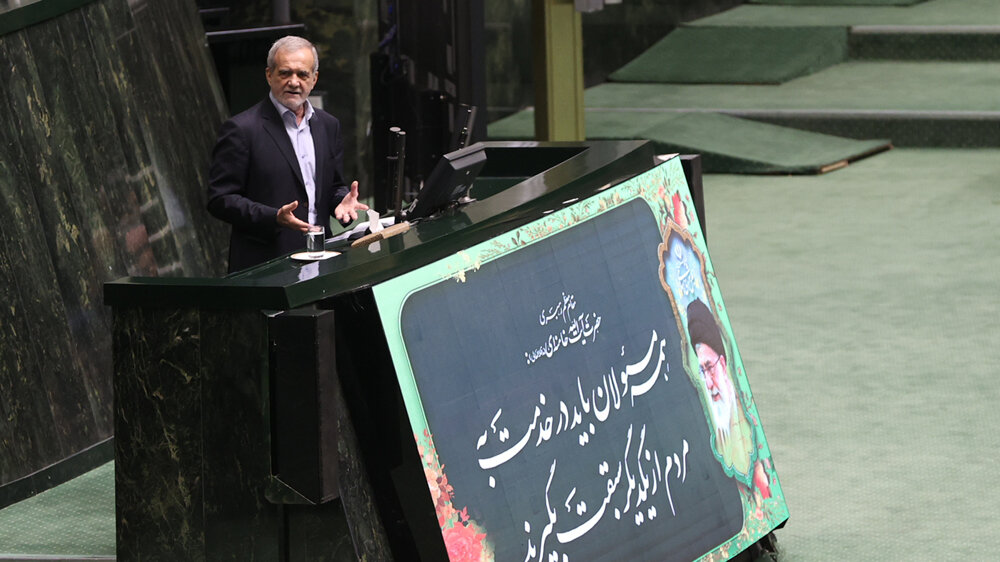TEHRAN – In a public parliamentary session on Saturday, President Masoud Pezeshkian stressed the need for unity and cooperation among the country’s three branches of government to effectively address Iran’s most pressing challenges.
During the session, Iran’s parliament began formally reviewing the qualifications of ministers proposed by President Pezeshkian, a crucial step in the formation of his new government.
President Pezeshkian expressed his strong support for the 19 nominated ministers and called on parliamentarians to seek peaceful and constructive solutions to the country’s problems rather than taking extreme measures.
He stressed the importance of maintaining honesty and transparency in dealings with the government, which he believes will further strengthen the trust and loyalty of the Iranian people.
In his speech to parliament, Pezeshkian described his cabinet as a “government of national unity” and stressed that it represents all Iranian citizens regardless of their origin.
He stressed that this government is committed to the rights of all citizens and puts national interests above all else.
Pezeshkian called for coordinated efforts by the executive, legislative and judicial branches to effectively meet the people’s demands. He warned that failure by the government to respond to people’s concerns in a timely manner could lead to widespread frustration and a possible erosion of public trust and national stability.
Pezeshkian highlighted the myriad challenges facing the country, pointing to significant “imbalances” in various sectors, including economic, social, environmental, educational and cultural.
Despite these problems, he praised the Iranian people’s continued love for their country and expressed confidence that with the right strategies, the public will support efforts to resolve these issues.
The President also said that his administration will promote equality and build relations with other countries based on the three principles of dignity, prudence and expediency.
“The future government will fight the enemies of Iran’s dignity, sovereignty and independence and work to promote social welfare,” he added.
“We should interact positively with all institutions, with the aim of convergence and consensus building, strengthening internal integration and prioritizing national interests over institutional, factional and sectoral interests,” Pezeshkian noted.
The President also called for policy-making based on scientific research and collective wisdom rather than decisions driven by personal interests or preferences. He reiterated his administration’s commitment to fighting corruption, protecting freedom of expression and promoting national dialogue.
Pezeshkian described US sanctions as the biggest threat to Iran and called for national solidarity to overcome this challenge.
He pointed out that while the economy is at the core of the country’s problems, it cannot be addressed in isolation from other critical areas. He argued that meaningful progress requires simultaneous reforms in both international relations and domestic politics.
“This can only be achieved with an integrated approach that takes into account both domestic and foreign policy issues, as well as the economic and political dimensions of our challenges,” Pezeshkian said. He stressed that such an approach requires cooperation and empathy from all three branches of government.
As part of the parliamentary procedure, President Pezeshkian had two and a half hours to defend his cabinet before the deputies. Following his defense, five opponents and five supporters of the proposed ministers presented their arguments.
The president presented his list of cabinet nominees to parliament on August 11, shortly after he was sworn in by the country’s MPs.
Parliament is expected to complete the process of assessing ministers’ qualifications by Wednesday, after which MPs will vote on whether to vote of confidence in the proposed cabinet.
If one of the proposed ministers does not win the vote of confidence, the president has up to three months to appoint a successor.
Although Pezeshkian’s cabinet attracted some criticism, he stood by his decisions and urged critics to wait to pass judgment until the cabinet had a chance to prove its mettle. He encouraged critics to evaluate the cabinet on the basis of its performance rather than on the basis of prejudice.
Parliament is now beginning its detailed review, and the outcomes of these sessions will be crucial for how Iran responds to both domestic and international challenges in the years to come.

